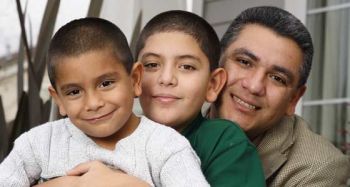 By Julie Garrison
By Julie Garrison
Special to DadsDivorce.com
In an academic paper, social scientists at Arizona State University discussed and made conclusions on two universally conflicted issues facing family law courts and policy makers today on the issue of shared parenting:
- Is the quantity or the quality of parenting time more important for children’s outcomes?
- Should parenting time be limited in families where there is high conflict between divorced parents?
It was commonly believed that quality parenting time was more important for children’s overall well being than the quantity of time.
It has also been the accepted belief that in a scenario where divorced parents have frequent conflict the noncustodial parent’s time with the children should be limited. It was assumed that observing divorced parents in conflict was damaging to the children.
“The strong connection between parenting time and father-child relationships in divorced families with both low and high levels of parent conflict, and the evidence and theoretical understanding that have built over decades about how unsupportive parent-child relationships impair long-term health means that the lingering situation of minimal parenting time for great numbers of children is a public health issue that demands the attention of researchers, policymakers and individual courts. Much research shows that children and divorced fathers generally want more parenting time. We do not see a compelling reason to doubt that, absent any unusual circumstances, granting and encouraging more parenting time, especially in high-conflict families, will be a good thing for the children.”
However, after examining these long-believed conclusions in the light of current evidence, the sociologists’ conclusions were far different:
The sociologists concluded:
- When a father has too little parenting time with his child, it creates a long-term risk in the physical and mental health of the child.
- Children and noncustodial dads want more time together.
- Even if a divorced dad and mom have frequent conflict with each other over parenting and other issues regarding their child, the child is better off spending as much time as possible with both parents.
- Shared parenting is the best child custody arrangement for the child – even if the parents have frequent conflict.
If the previous conclusions are indeed accurate, judges, therapists, court-appointed mediators, divorce attorneys and other family law professionals are going to need to be re-educated in these new conclusions on the shared-parenting issue.
Julie Garrison has been writing articles and short stories for the past 10 years and has appeared in several magazines and e-zines.


Although we appreciate the article —- we should not have to ask for citations. Please follow basic protocol.
Sole custody has bee proven to be a form of child abuse
Dr. Warren Farrell spent 13 years collecting all teh research on this from around the world and this metasyudy proved that sole custody is child abuse. SOme of the statistics can be found here:
http://fathersunite.org/statistics_on_fatherlessnes.html
Bottom line is that social pathologies in children go up 14,600% (yes a factor of 146 times more) when a child is under sole custody).
He has a DVD summarizing this research and conclusions, extracted from over 225 scientific studies). It is available at http://www.BestInterestOfChildren.org.
In response to “Falsely Accused in OH”
Here is the study:
Fabricius, William V., Diaz, Priscila, Braver, Sanford L. (2011). Arizona State University. Parenting Time, Parent Conflict, Parent-Child Relationships, and Children’s Physical Health. Retrieved from http://sharedparentingresearch.info/
Need more info
Julie, I really appreciated this information, but would you please provide references to the conclusions shared by the socialogists? Where can I find this so I can use the information?
Thanks!
Thank you
Thank yo for posting this. I am going to glom selected quotes from the actual study and send it to my caseworkers in my attempt to get more time.